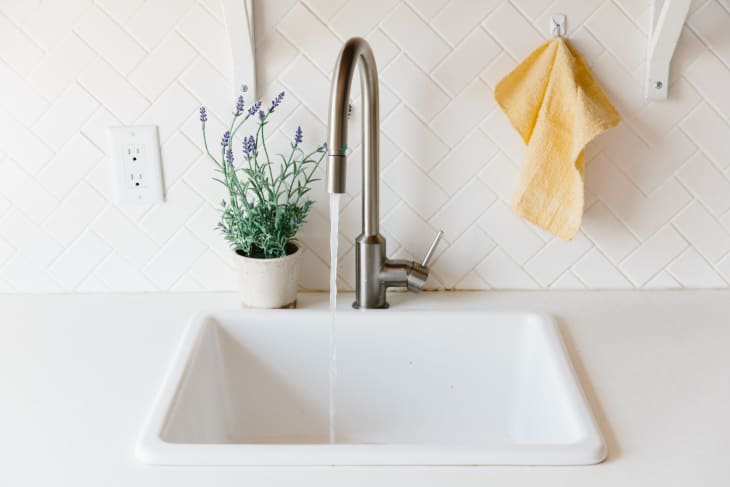8 Things to Never Do When Washing Dishes by Hand
Think you know how to wash dishes by hand? You probably do! (Hint: clean each dish with warm water and a soapy sponge or scrubber until food residue no longer remains.) You also probably make a mistake here and there when you’re elbow-deep in suds. (First of all, you should never actually be elbow-deep in suds!)
Here are eight things you should never do when you’re washing dishes in the sink. These things are especially useful to keep in mind these days, when you might have more dirty dishes than usual.
1. Don’t overthink it.
Staring down a pile of dirty dishes after cooking dinner is daunting. It just always looks like it’s going to take forever. And you’d rather spend “forever” sitting on the couch, watching TV. The reality: It usually doesn’t take that long. You can almost always get it all done in less time than you’d think.
If you just can’t bring yourself to do every last dish, try the “One Soapy Sponge” trick to get started: squirt soap onto a sponge, wash until it stops bubbling, and take a break. Another trick: Set a timer. Once you see how quickly it really goes, it’s easier to get started the next night.
2. Don’t use a dirty sponge.
Sponges get gross long before they start to smell or change color. It’s sad but true. Change out your sponge every week or so and you won’t have to wonder whether you’re spreading bacteria around a plate or cleaning it.
Related: The Best Way to Sanitize Your Kitchen Sponge Is Not What You Think
3. Don’t wash with bare hands.
Take a minute to pull on gloves (you’ll have to shop for a good pair ahead of time) before you get to work. It sounds old-fashioned, but wearing gloves can keep your hands better moisturized and in better shape. If you’re a manicure person, your manicure will last longer. Plus, the gloves will keep your hands protected against super-hot water, which is best for getting your dishes extra clean.
Related: 5 Surprising Things I Learned from Washing Dishes with Gloves for a Week
4. Don’t skip the soak.
One trick to save time: Designate an already dirty large bowl or pot as the soaker zone as you’re cooking. Fill it with warm water and a couple drops of soap. Then, as you finish using the smaller stuff, toss it in the soaker bowl. When it’s time to wash those items, they’ll be easier to clean. Ditto for the vessel they’re sitting in.
Beyond that, don’t be afraid to let bigger pots and pans sit in the sink overnight. There’s seriously no shame in going to bed with dirty dishes in the sink. Even Ina Garten does it!
5. But don’t soak stuff that shouldn’t be soaked.
Cast iron and wood should not be soaked. You know that, so don’t do it! You also shouldn’t soak your knives, as it can cause the blades to rust or mess with the handles (if they’re wooden). You’re better off just leaving these dirty items on your counter next to the sink and washing them when you’re ready.
6. Don’t use too much soap.
It’s tempting to go overboard with the dish soap, thinking more is more — but that’s not really the case. In fact, you probably need way less than you’re using. To figure out the perfect amount, try squirting dish soap into a small bowl and mixing it with water, then dipping your sponge into that solution as you clean. You’ll be surprised how little soap you need — and the rinsing process will be easier, as well. Another idea? Put a rubber band around the pump of the dispenser. This will limit how much soap you get with every pump without you having to think about it!
7. Don’t reach into your sink all willy nilly.
Let’s say the water in your sink is starting to back up or you just have a ton of stuff in there. And let’s say you have a ceramic knife in there. If you reach in there without caution, you could easily cut yourself! Watch what you’re doing and consider keeping sharp or pointy stuff (forks, for example!) in a special section or try that soapy bowl trick from above.
8. Don’t put the dishes away if they’re still wet.
Drying dishes is a key part of the dish-washing process! If you put stuff away when it’s still wet, moisture gets into your cabinets, and that can warp the material and foster the growth of mildew. Don’t feel like drying everything? Just let your dishes sit on a drying rack or pad overnight.
Related: The Best Dish Drying Racks and Mats, According to Kitchn Editors
Got anything else to add? Leave your thoughts in the comments below!
